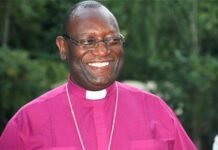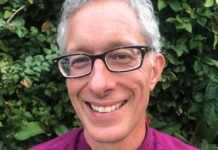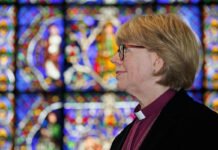Episcopalians across the Diocese of Los Angeles are mobilizing networks of Sacred Resistance to support vulnerable communities targeted by the new federal administration’s threats of mass deportations and rollback of other rights.
In its first week, the Trump White House launched a broad crackdown on immigration, closing off access to asylum protections at U.S. borders, sending active duty military troops to help with border barriers and removal flights and removing sanctuary status formerly afforded to schools, churches and hospitals, according to a report by the National Public Radio.
From Pomona to Los Angeles to Orange County, clergy, laity and activists are gearing up to offer educational resources, advocacy, service, emotional support, emergency action and long-term accompaniment on behalf of the vulnerable, including immigrants and LGBTQ+ communities who feel targeted, activists said at a recent gathering at St. Barnabas Church in Eagle Rock.
All Saints Church associate rector, the Rev. Mark Chase, a board member of Young & Healthy in Pasadena, said the nonprofit organization is strategizing and navigating how to provide free medical and other health care services to a community “with the legitimate fear and anxiety” that they will be targeted by U.S. Immigration Customs and Enforcement (ICE).
“People are just afraid to show up and receive community services, like, for example our mobile dental clinic, out of fear ICE will be there,” Chase told the hybrid gathering, via Zoom. “They no longer want to submit any kind of documentation that we actually need in order to serve them, out of fear that that information will end up in the hands of ICE. And yet, there are so many needs folks have that won’t stop because they’re now being targeted.”
A social worker attending the meeting agreed, noting she’d be willing to disseminate information. “I serve the HIV community and there are a lot of people concerned about ending birthright citizenship. A lot of them are citizens, and they still say, ‘Do I have to carry my passport? I don’t want to be a target; I’m a U.S. citizen.”
The Rev. Susan Russell, diocesan Canon for Engagement said “We’re calling this Sacred Resistance 2.0, in the wake of this election and we’re building it as we fly, re-engaging partnerships and collaborations and building new ones.
“We’re one week into this new administration, so we’re still building and trying to understand how much of what was threatened is actually going to happen, how much of what is now being promulgated in the media is actually happening and not just a bluster,” said Russell, who serves as diocesan staff liaison to Sacred Resistance.
“One of the things I’m seeing most quickly is the impact on our Trans and LGBTQ youth, who are already feeling vulnerable,” she added. “There is a deep sense of despair in these young people that are looking for hope. They’re looking for inspiration and are looking to leadership like this (gathering) to tell them that we do have their backs, and we will make a difference, and the world doesn’t always have to be the way it is, and that when we fight, we win.”
Los Angeles Bishop John Harvey Taylor, and who was present at the Eagle Rock meeting said, in a Jan. 21 statement to the diocese: “Since 2016, we have been a sanctuary diocese. That means it is up to each of us to make a sanctuary in our heart for immigrant workers and their families, especially workers of color, and, if we are so called, to provide concrete assistance, including through political advocacy, as advised in the days and weeks ahead by our Sacred Resistance ministry.”
Resources are available through the wider Episcopal Church and locally through the Interfaith Refugee and Immigration Service, an institution of the diocese, which has been caring for refugees, asylees, and migrant workers since 2004, he said.
The radical equality of people without regard to orientation or identification is guaranteed in the canons and resolutions of The Episcopal Church, Taylor added. “In the Diocese of Los Angeles, let us make all our siblings safe and welcome, and let us advocate for their God-given rights from the pulpit, in Bible study, at City Hall, and in messages to our representatives in government.”
“Our trans and immigrant worker siblings were made for God’s purposes,” Taylor added. “They are instead being offered as living sacrifices for politicians’ self-interest. This moment in the life of our nation is, as all moments are, an opportunity for personal and community discernment about our individual and shared vocations at home and in the world, especially when it comes to ministry to those most at risk. Learn more about our diocese’s LGBTQ+ ministries here.
In 2016, during President Donald Trump’s first term of office, delegates attending the 121st annual meeting of the diocese declared Los Angeles a sanctuary diocese and pledged to resist then threatened mass deportations. The resolution also called upon individual churches to consider becoming sanctuary congregations, “serving as places of welcome, refuge, healing, and other forms of material and pastoral support for those targeted by hate due to immigration status or some perceived status of difference.”
Sacred Resistance organizers are the Rev. Francisco Garcia, the Rev. Greg Kimura, rector of St. James, South Pasadena, and the Rev. Jaime Edwards Acton, rector of St. Stephen’s, Hollywood and St. Barnabas’ priest-in-charge, who have said they hope to create a network of local hubs to offer advocacy, rapid response teams and other support to the vulnerable.
St. Paul’s Church in Pomona, has reprised “ICE Out of Pomona,” originally created during the first Trump Administration, said Sandra Martinez Moore, a parishioner and organizer. St. Paul’s has joined with local nonprofits and other organizations to offer, and train other churches and individuals to host, ‘Know Your Rights’ workshops; to create phone trees and other emergency communication methods to rapidly respond in the event of an ICE raid; and to seek the support of civic officials and local governments, she said.
“We are afraid,” Martinez Moore told The Episcopal News in a recent telephone interview. “The fear is there. But what’s greater is the fear of not doing anything, and watching our brothers and sisters being arrested and deported. That is even more scary. That’s given us the feeling we’ll do whatever we can, just to help.”
Similarly, the South County Crosscultural Council in Laguna Beach, which manages a Day Worker Center, aims to build a network of support and resistance throughout Orange County churches and religious institutions, according to Tim Hartshorn, director.
“Churches are prominent here in Orange County; a great avenue, because the congregations are quite close,” he said. “People know each other really well and a lot of volunteering is facilitated through congregations.”
Joyce Swaving, a St. George’s parishioner who serves as “bridge-builder” for the Laguna Hills church, said the flurry of executive orders and threatened deportations have fueled a kind of emotional and spiritual “terrorism” among the community, with many afraid to go to work or even to go outside, for fear of being arrested and deported. “That’s what terrorism is, to live in terror of what may happen; to be in such uncertainty.”
Swaving added: “As an immigrant myself, growing up in a family where American culture and language was often challenging for my parents, I have a sensitivity for folks who may feel marginalized. Hospitality, day workers, and all those who provide other essential services, such as senior adult caregivers and childcare providers, are often overworked, underpaid, unseen and not recognized for all the ways they contribute to their communities.
“In this social and political climate, it is more important to me than ever, for me to stand in solidarity with those who are feeling anxious and viewed by certain groups as being a burden to society, labeled as criminals and the cause for the country’s financial hardship.”
Hartshorn added: “The basic idea is, if there are more people around the center who, frankly, don’t look like day workers, ICE will be less likely to pay us a visit. We are asking people to demonstrate support and advocacy, as a kind of preventative buffer against potential interest from ICE, and also to have people there as witnesses in the event ICE does come.”
Martinez Moore agreed. “I am so proud of Sacred Resistance, because of the first time how they stood up, how they defended and fought the fight. Because of them, I decided to get involved, and to get the courage to stand up and do something about it, even if it’s a little bit, but to do something to help my brothers and sisters.”
She added: “If it wasn’t for Sacred Resistance through The Episcopal Church, I would have stayed home and prayed and watched silently. We preach, but I want to see actions, now is the time.



